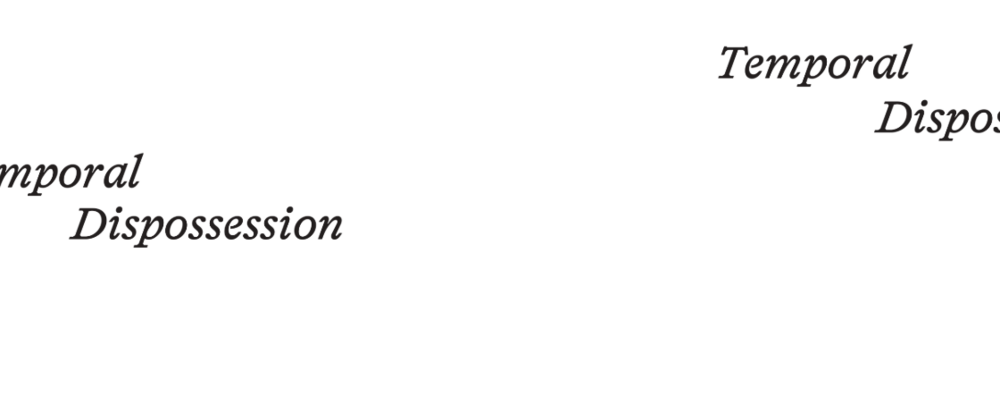Abstract
This thesis sets out from the post-2015 Swedish asylum legislation, which made Sweden’s asylum policy among the most restrictive in the EU. The most decisive changes were the shift from permanent to temporary residence permits as the standard protection provided, along with the increasingly blurred lines between migration regimes and labour market policies. With temporary residence permits as the new norm, time and labour market productivity are central to the distribution of vulnerability and life chances, as labour market participation functions as the only means of qualifying for permanent residence. The policy shift can be seen as an institutionalization of temporality and deportability, as it carries the inherent risk of deportation if residence permits are not reissued upon renewal.
Against this background, this thesis draws on temporal enactments of dispossession and racial capitalism as a theoretical framework to analyse how the control of time results in different forms of dispossession – a feature that is closely tied to the selection logics of late racial capitalism, namely: differentiation, devaluation, and competition. Although dispossession has been conceptualized as a mechanism of authoritative control over the spatial, emotional, and relational aspects of (neo)colonized subjects’ lives, research often fails to recognize the significance of time and temporality in understanding this process. Here, I seek to bridge this gap. Furthermore, where migration studies have been critiqued for perpetuating methodological nationalism, temporal dispossession foregrounds time as central to the distribution of rights to make visible how the control of time is an experience shared across multiple positions – citizens and non-citizens alike. While this directs our attention to the continuum of temporal control, those
positioned as migrants are often experiencing the most acute effects of the temporal restrictions that affect access to rights.
The thesis builds on four years of ethnographical engagements with interlocutors who sought asylum between 2015 and 2017, and interviews with street-level bureaucrats, from the Swedish Migration Agency, NGOs, asylum lawyers, to the Swedish Public Employment Service. Consequently, engaging with the interlocutors’ experiences through the theoretical lens of temporal dispossession is a means of centring time not only within the workings of racial capitalism, but also on how border regimes work to sustain racial capitalism and how labour market exploitation is exacerbated by the legal liminality the interlocutors inhabit.
Chapter 5, on temporal dispossession through migration bureaucracy, examines the temporal dimensions of the Migration Agency’s New Public Management (NPM) procedures as they assess asylum applications. It traces the enforced deceleration, interrupted by pockets of acceleration, that obscures the interlocutors from frames of intelligibility in the asylum process. Here, temporal dispossession consists of preventing those seeking asylum from making progress in their cases, using temporal means of discarding their need for protection and relegating them to a different pace of time as compared to the surrounding society, effectively positioning them as untrustworthy and thus as undeserving asylum subjects.
Chapter 6 investigates ‘islands of dispossession’ where time and space merge in the analysis of the body as the most intimate scale of such islands, asylum camps and make-shift camps as the national scale, and enforcement archipelagos as the global scale. Together, these tease out the role of temporal dispossession in carceral geographies and the role of border regimes in sustaining racial capitalism. The chapter also engages with how interlocutors redefine and resist the spaces of the camp through community formations.
The final analytical chapter on the workings of temporal dispossession in the labour market (Chapter 7) examines the productivity of time in the production of surplus, cheap, and disposable labour forces, where labour market participation constitutes the only means of securing permanent protection. This is examined through the interlocutors’ experiences navigating the informal labour market, ‘fast track’ labour market programmes, and their attempts to ‘switch’ tracks from asylum to labour market migration to secure their futures and reduce the pervasive threat of deportability.
Taken together, the thesis seeks to contribute to research on how dispossession operates in and through the border regime, specifically through its temporal configurations, and how the latter is weaponised to dispossess people of their life chances. The thesis further seeks to contribute to research on the political economy of borders in the Nordic context by examining the operation of racial capitalism through the welfare state, where labour market exploitation is exacerbated by the precarity produced through its migration bureaucracies.
Keywords: temporal dispossession, racial capitalism, border regime, welfare state, Sweden, asylum
